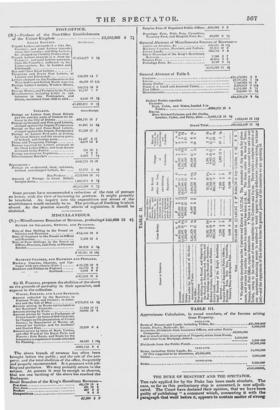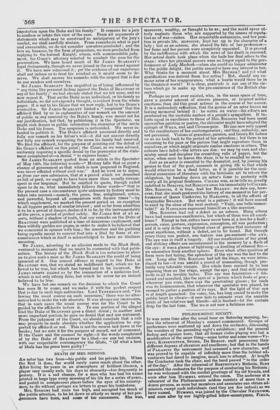THE DUKE OF BEAUFORT AND THE SPECTATOR.
THE rule applied for by the Duke has been made absolute. The case, so far as this preliminary step is concerned, is now adjudi- cated. The Court have declared their opinion, that we have been guilty of publishing "a comment which, connecting it with the paragraph that went before it; appears to contain matter of strong- imputation upon the Duke and his family." It remains for a jury to confirm or refute this view of the case. From All arguments or
statements which may he construed as anticipatory of the jury's verdict, we shall carefully abstain. From remarks on what is past and irreversible, we do not consider ourselves precluded ; and the less so, because, by the 'form of procedure, we were precluded from replying to the learned Knight, whom, with .commendable judg- ment, his Grace's attorney selected to conduct the case for the
prosecution. We have heard Much of Sir JAMES SCARLETT'S
legal disingenuity, though we never joined in the cry raised against it. We have now witnessed it ; yet the evidence of our experience shall not induce us to treat his conduct as it might seem to de- serve. We shall answer his remarks with the respect that is due to our readers and ourselves. • • • • • • • •
Sir JAMES SCARLETT has acquitted us of being' influenced by "any thing like personal feeling against the Duke of BEAUFORT or zny of his family ;".we hail already stated that we felt none, and we now repeat it. That on the Duke as an indiVidnal, or his family as individuals, we did not expend a thought, is evident from the whole paper. It is not to his Grace that we now reply, but to his Grace's counsellor. Sir JAMES SCARLETT hinted a "suspicion" that the affidavit filed by us in explanation of our remark on the amount of public msney received by he Duke's family, was meant not fur our justification, but -that, by publishing it in the Spectator, we might sink 'deeper in public -estimation the character of the noble Duke and his house. . Tile suspicion is .unfounded. We never in- tended to publish it. The Duke's affidavit answered directly and fully our remark on his father's will—it did not answer directly nor fully our remark respecting the sums his family had received. We filed the affidavit, for the purpose of pointing out the defect of his Grace's affidavit on this point ; the Court, as we were advised, uniformly requiring a specific denial by the prosecutor of the state- ment complained of-a denial "in express terms." Sir JAMES SCARLETT quoted from an article in the Spectator • of May lath. the following words—" History tells that so great a change of government as that which is now proposed in England, was never effected without civil war." And he went on to argue, as from our own admission, that at a period which we described as full of peril, we ought to have been more than usually circum- spect in our language. But he omitted to quote, though called upon to do so, whet 'immediately follows these words—" that in the present case a circumstance quite unknown to history must be taken into account—namely, the press, free, enlightened, active, and powerful, beyond all comparison with former times "—by which supplement, we marked the present period as an exception to all bygone periods of similar interest ; and so far from admitting it to be a period of danger, declared it to be, by the instrumentality of the press, a period of perfect safety. Sir JAMES first of all as- serts, without a shadow of•truth, that our remarks on the Duke of BEAUFORT were published at a time of dangerous excitement, and then wilfully garbles our pages, in order to make it be believed that we concurred in opinion' with him ; the assertion and the garbling being equally meant to convert that into a libel by force of cir- cumstances which in itself is acknowledged to have no libellous
meaning. •
Sir JAMES, adverting to an allusion made to the Black Book, ventured to insinuate that we mightbe connected with that publi- cation. The history of the Black Book is too notorious to allow us to give such a man as Sir JAMES SCARLETT the credit of being ignorant of it. Our utmost offence in regard to the Duke of BsauFoar was, that we stated an indifferent fact, which we be- lieved to be true, but which has turned out to be incorrect. Sir JAMES retorts against us by the inSinuatiori of a malicious fact, which is not only utterly false, but which he never for an instant believed to be true.
We have but one remark on the decision' to which the Court has seen fit to come, and we make it 'with the perfect respect that is due to such high authorities. Lord TENTERDEN said, "fol- lowing the usual course on such occasions," there was no alter- native but to make the rule absolute. It was always our impression, that in such cases the usual course was for the Court to be guided by the affidavits before it. To one portion of the alleged libel the Duke of BEAUFORT gave a direct denial ; to another and more important portion, he gave no denial that met our statement. From the judgment of the Court, we-should conclude that a rule may properly be made absolute whether the application be sup- ported by affidavit or not.. This is not the course laid down in the books ; but we note it for the purpose of record, not of comment. If the Court and the counsel be right—if the words complained of by the Duke of BEAUFORT be a libel—we can but exclaim, with our respectable contemporary the Globe, " Of what a host of libels has the press been guilty! "



























 Previous page
Previous page